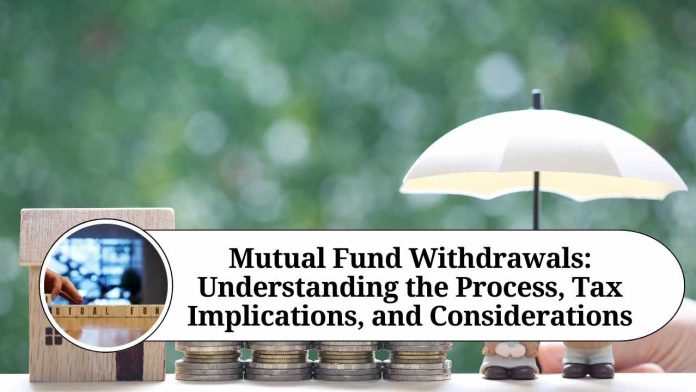Mutual funds are a popular investment option for many individuals, as they offer the potential for higher returns than traditional savings accounts and can be more accessible than other investment vehicles like stocks and bonds. However, once you’ve invested in a mutual fund, you may be wondering how and when you can withdraw your money. In this blog, we’ll explore the ins and outs of mutual fund withdrawals, including when you can withdraw, how to withdraw, and the potential tax implications.
When Can You Withdraw From a Mutual Fund?
Generally, you can withdraw from a mutual fund at any time. However, there may be some restrictions on how often you can make withdrawals or how much you can withdraw at once. These restrictions will vary depending on the specific mutual fund and the investment company that manages it. For example, some mutual funds may require a minimum holding period before you can withdraw your money, while others may have limits on the number of withdrawals you can make in a given time period.
How to Withdraw From a Mutual Fund
The process for withdrawing from a mutual fund will also vary depending on the specific fund and investment company. Typically, you can request a withdrawal through your investment account either online or by phone. You may be asked to specify the amount you wish to withdraw and the account you want the money to be transferred to. In some cases, you may also be required to fill out a withdrawal form.
Once you’ve requested a withdrawal, the investment company will typically process your request within a few business days. The exact timeline will depend on the specific fund and investment company, so be sure to check the withdrawal policies for your mutual fund.
Tax Implications of Mutual Fund Withdrawals
When you withdraw money from a mutual fund, you may be subject to taxes. The amount of taxes you owe will depend on a few factors, including how long you held the investment and the type of account you used to invest in the mutual fund.
If you held the mutual fund for less than a year before making a withdrawal, you may be subject to short-term capital gains taxes. These taxes are typically higher than long-term capital gains taxes, which apply to investments held for over a year.
If you invested in a mutual fund through a tax-advantaged account like an IRA or 401(k), you may be subject to additional taxes or penalties if you withdraw before a certain age or under certain circumstances. Be sure to check the withdrawal policies for your specific account type to avoid any unexpected taxes or penalties.
In addition to understanding the withdrawal process and potential tax implications, it’s also important to consider the reasons for withdrawing from a mutual fund. While mutual funds can offer the potential for higher returns than traditional savings accounts, they do come with some level of risk. If you’re investing in a mutual fund for a specific goal or need, like saving for a down payment on a house or funding your child’s education, it’s important to have a plan in place for when and how you will withdraw your money.
It’s also worth considering the fees associated with mutual fund withdrawals. Some investment companies may charge a fee for withdrawing your money, especially if you’re making frequent or large withdrawals. Be sure to check the fee schedule for your mutual fund and investment company before making any withdrawals.
If you’re considering withdrawing from a mutual fund, it may be helpful to consult with a financial advisor. A financial advisor can help you understand the potential tax implications and fees associated with your withdrawal, as well as help you develop a plan for achieving your financial goals.
Conclusion
Mutual fund withdrawals are generally flexible and accessible, but it’s important to understand the withdrawal process and potential tax implications before making any withdrawals. Consider the reasons for withdrawing, any fees associated with the withdrawal, and consult with a financial advisor if needed to ensure that you’re making informed decisions about your investments.
Other Related Blogs: Section 144B Income Tax Act
Frequently Asked Questions (FAQs)
Q.How long does it take to process a mutual fund withdrawal?
The processing time for a mutual fund withdrawal can vary depending on the specific fund and investment company. Generally, it can take anywhere from a few business days to a few weeks for the money to be transferred to your account.
Q.Can I withdraw money from a mutual fund at any time?
Yes, you can generally withdraw money from a mutual fund at any time. However, there may be restrictions on how often you can make withdrawals or how much you can withdraw at once. Be sure to check the withdrawal policies for your specific mutual fund and investment company.
Q.Will I owe taxes on my mutual fund withdrawal?
The tax implications of a mutual fund withdrawal will depend on several factors, including how long you held the investment and the type of account you used to invest in the mutual fund. You may be subject to short-term or long-term capital gains taxes, as well as additional taxes or penalties if you withdraw from a tax-advantaged account like an IRA or 401(k) before a certain age or under certain circumstances.
Q.Are there fees for withdrawing from a mutual fund?
Some investment companies may charge a fee for withdrawing money from a mutual fund, especially if you’re making frequent or large withdrawals. Be sure to check the fee schedule for your specific mutual fund and investment company.
Q.Should I consult with a financial advisor before making a mutual fund withdrawal?
It can be helpful to consult with a financial advisor before making any investment decisions, including withdrawing money from a mutual fund. A financial advisor can help you understand the potential tax implications and fees associated with your withdrawal, as well as help you develop a plan for achieving your financial goals.




















